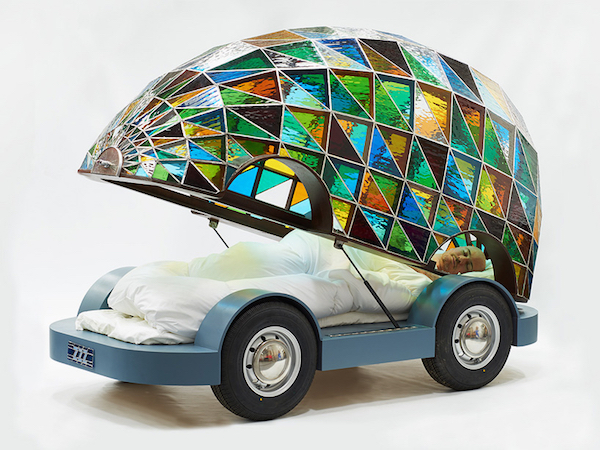n. A proposed driverless car that is completely autonomous, enabling its human occupants to sleep on long or overnight trips.
2015
Being whisked from point A to point B in a robot-chauffeured vehicle has some obvious attractions: one can imagine reading, chatting, working, or even sleeping during the daily commute. Alternatively, picture retiring for the night in a sleeper car in one city, and waking up well-rested at your destination hundreds of miles away.
2015
'Sleeper cars' will become available for long journeys where you’ll simply set off at night, tuck yourself into the incorporated bed, with blacked-out windows if there are windows at all, and wake up right outside your destination, be it Land’s End to John O’Groats, or a cross-Europe trip.
2014
without typical safety equipment we're currently accustomed to — such as air bags and bumpers — the single person 'sleeper car' comprises only an automated navigation held within a modular shell, onto which a habitable space can be built.
2008 (earliest)
Another early robocar might be the "sleeper car." This would be a car with beds rather than seats, designed for long-haul, overnight traffic at slow speeds.
The phrase sleeper car has at least two other senses. The oldest sense refers to a section of a train that offers sleeping facilities, which dates to at least 1875. The more recent sense refers to a powerful car that looks plain on the outside, which dates to 1983, although I expect it's a decade or two older than that. (The more general sense of a sleeper refers to anything with a value or characterisitic that turns out to be much greater than one would have expected. This sense goes back to the late 19th century.)
 A concept sleeper car by Dominic Wilcox. Source: Sylvain Deleu; designboom
A concept sleeper car by Dominic Wilcox. Source: Sylvain Deleu; designboom
 A concept sleeper car by Dominic Wilcox. Source: Sylvain Deleu; designboom
A concept sleeper car by Dominic Wilcox. Source: Sylvain Deleu; designboom